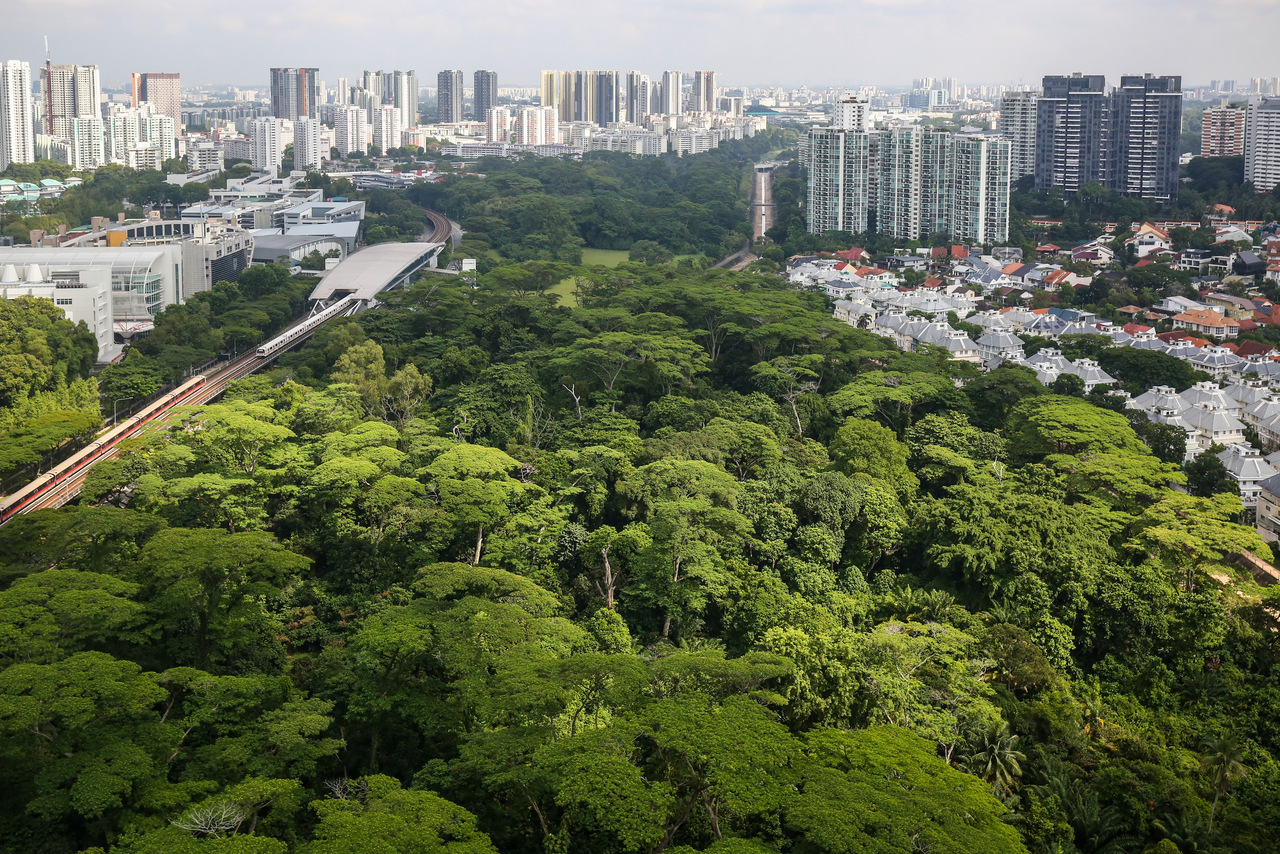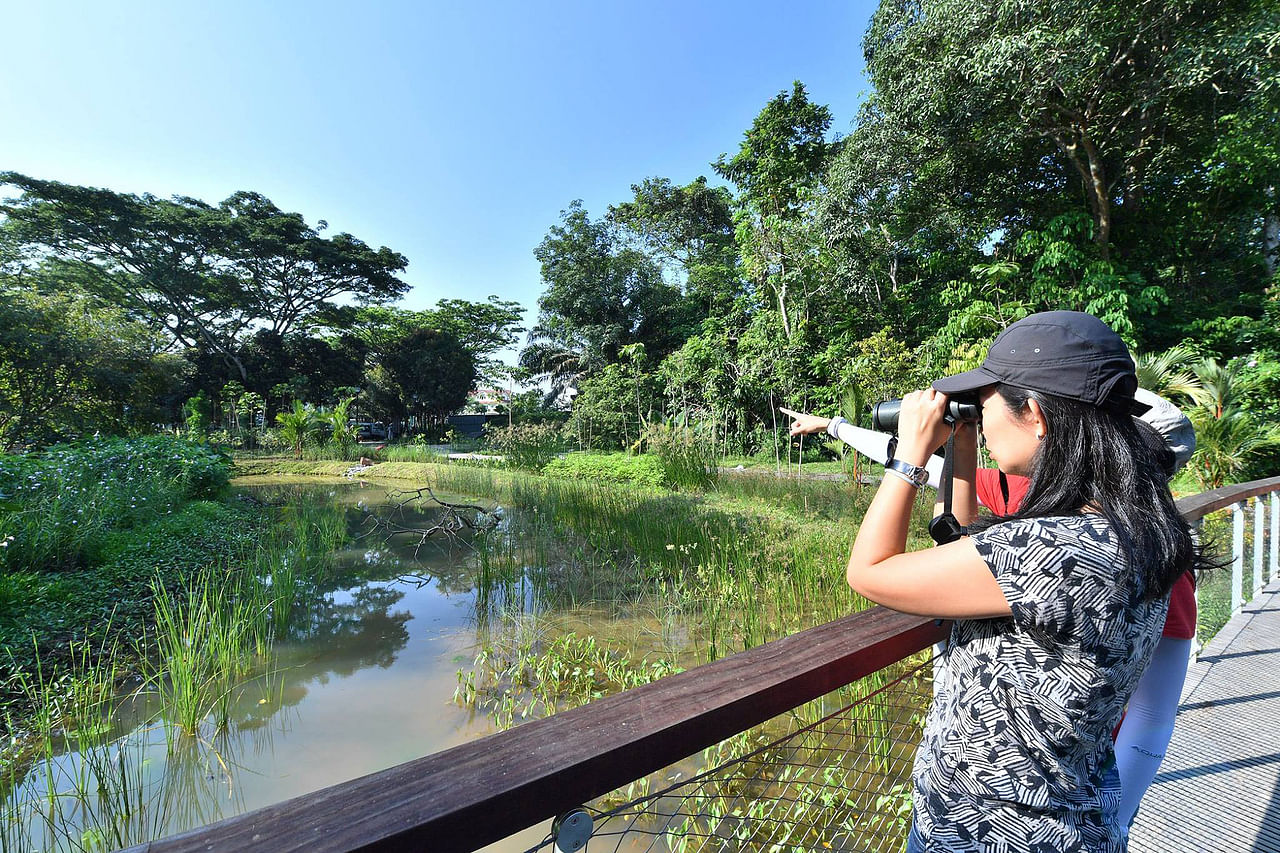Singapore joins 130 countries in signing pledge to end deforestation by 2030
Sign up now: Get ST's newsletters delivered to your inbox

Singapore is reaffirming its commitment to developing the city sustainably and protecting nature that thrives on the island by endorsing the declaration.
PHOTO: LIANHE ZAOBAO
GLASGOW - Singapore has joined more than 130 nations in signing a declaration that aims to halt and reverse forest loss and land degradation by 2030.
The Ministry of National Development (MND) said on Friday (Nov 12) - the day the COP26 climate summit in Glasgow is scheduled to wrap up - that National Development Minister Desmond Lee has endorsed the Glasgow Leaders' Declaration on Forests and Land Use.
The Glasgow Leaders' Declaration on Forests and Land Use was first launched on Nov 2 by the British presidency of COP26.
There were more than 100 signatories then, covering about 85 per cent of the world's forests. The first group of signatories included the European Union and countries such as Brazil, Indonesia, the United States and Congo.
But other nations have since put their names on the declaration, including Singapore and Uzbekistan, although Indonesia seems to have backtracked on its pledge.
About 91 per cent of the world's forests are now covered under the pledge.
"Singapore is committed to national and global climate action," said MND in a statement. "Forests and terrestrial ecosystems play an important role in reducing the effects of climate change, and it is crucial to ensure sustainable land use and the conservation of forests."
By endorsing the declaration, MND said Singapore reaffirms its commitment to developing the city sustainably and protecting nature that thrives on the island.
The National Parks Board (NParks), an agency under the MND, has been rolling out reforestation and wildlife conservation programmes that have helped wildlife thrive in the country's fragmented forests, including species on the brink of extinction.
For instance, the Republic's green spaces have been a stronghold for the critically endangered Sunda pangolins and straw-headed bulbuls - a song bird often poached for the pet trade.
Still, nature groups in Singapore have called for the preservation of other unprotected forest patches in the country, which have been felled to make way for housing projects or industrial developments and train lines.
Mr Lee said sustainability and stewardship are core principles in Singapore's approach to land use planning.
"As a small city-state with many competing demands for our limited land, we will continue to develop our city sustainably while conserving nature within our urban environment. That is why Singapore has decided to endorse the Glasgow Leaders' Declaration on Forests and Land Use," he said.

Parkgoers at Windsor Nature Park. Singapore's effort to become a City in Nature will help to conserve biodiversity and provide Singaporeans with greater access to nature and its benefits.
PHOTO: NPARKS
MND said that some vegetated sites in Singapore have to be developed to meet people's needs given the country's space constraints and competing demands for land.
"Some of these sites had formerly been used for human habitation, agriculture and industry. They were then cleared while awaiting redevelopment and have become vegetated over time," the ministry said.
"We carefully balance development and conservation in our land use planning," MND added, saying it adopts a science-based approach in selecting sites for development.
"For example, in assessing whether to develop vacant sites that were previously cleared for human use but have since become vegetated, factors such as whether they provide critical refugia for native biodiversity and whether they play an important role for ecological connectivity are taken into account," said MND.
For sites identified for development, the potential environmental impacts are carefully studied and mitigated. Natural elements will be conserved and integrated within developments where possible, to facilitate ecological function.
Under the country's City in Nature vision - where greenery is infused into the cityscape - MND said Singapore's core biodiversity areas will be conserved and protected, natural habitats will be enhanced and restored, and Singapore's ecological resilience will be strengthened.
"For example, we are adding new nature parks which buffer our nature reserves, restoring tropical rainforest and wetland habitats in national parks and gardens, integrating greenery more intensively into our urban environment, and strengthening ecological connectivity between biodiverse green spaces," MND added.
Mr Lee, who has been pushing for Singapore to transform into a City in Nature, thanked nature groups and non-government organisations, private enterprises, researchers and the wider community for their efforts in helping to make Singapore greener and more liveable and sustainable.
The burning of fossil fuels is the primary contributor to the atmospheric blanket, but land use changes and deforestation are the second-largest contributor.
The Paris Agreement, adopted in 2015 by almost 200 nations, aims to limit planetary heating to 2 deg C - preferably 1.5 deg C - above pre-industrial levels.
This threshold will help reduce the impact of climate change, including more frequent extreme weather events, sea-level rise and more intense storms, climate scientists say.
The planetary crisis today is caused by an ever-thickening layer of greenhouse gases in the atmosphere, which traps heat and throws the Earth's systems out of whack.
But ecosystems, such as tropical rainforests and peatlands, have the natural ability to take in planet-warming carbon dioxide through photosynthesis and then convert it to biomass in their trunks, leaves, roots and soils - locking away the carbon from the atmosphere.
Forests are the lungs of the planet, absorbing around one-third of the global carbon dioxide released from burning fossil fuels every year, said the British host of COP26 in a statement. "But we are losing them at an alarming rate. An area of forest the size of 27 football pitches is lost every minute," it added.
MND said Singapore's efforts to become a City in Nature will help to conserve biodiversity and also provide Singaporeans with greater access to nature and its benefits on health and well-being.
It added: "They will also help strengthen Singapore's resilience to the effects of climate change, through the application of nature-based solutions to help protect our coastlines from erosion, cool the urban environment, and reduce the risk of flash floods."
Professor Koh Lian Pin, who helms the National University of Singapore (NUS) Centre for Nature-based Climate Solutions, welcomed Singapore's endorsement of the declaration.
He told The Straits Times: "The signing of the declaration demonstrates our commitment to nature conservation and addressing climate change as a global emergency."


